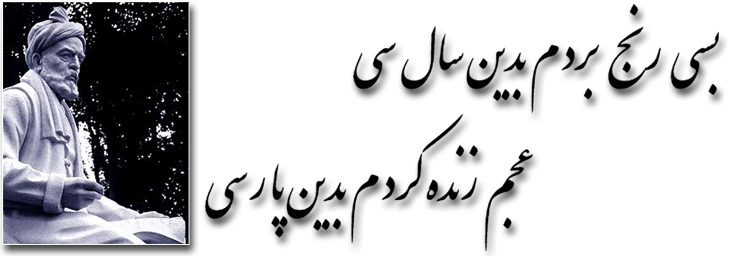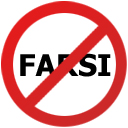|
|
||||||||||
|
Translation: Much did I suffer in these thirty
years to remain alive Persian language. (Ferdosi 1000 A.D.) |
||||||||||
Thank you for visiting our web site. Our goal is to prevent anybody, (organizations, media, press, etc.) from using "farsi". Please read our articles carefully. |
||||||||||
| Last Update: 21/May/2006 | ||||||||||
|
||||||||||
| Recently, American and European leading media
always used the word
"farsi" to point out Persian language, on the other hand after the
destruction of the Taliban in Afghanistan, journalists around the world always heard the word "Dari"
as the language of Afghans from Afghan officials\people, meanwhile
Tajikistan's government is trying to make familiar "Tajiki" in English
language. But how these words must use in English and other
western languages ? |
||||||||||
:: Origin: |
||||||||||
|
"fars + i" is the Arabic form of the Persian word "pars + i"; what "Pars" means?. "Pars" in Persian means somebody who's Persian
and also it means the land of Persians. Its equivalents in English are
"Persia" (as noun) and "Persian" (as adjective) and are from the Greek
word "Persis". |
||||||||||
:: Is "farsi" the modern name for Persian language? |
||||||||||
|
No, "farsi" comes from Muslims' holy book "Qur'an" which
has written
14 centuries ago,
in Arabic language there's no any "P", so they're using the word
"FARS" (in Arabic: al-farsiyah) to indicate Persians and
Persian language, since Arabs conquered Persian Empire, Iranians became
Muslim, everybody in Middle East used Qur'anic word for point out
language. Iranians also use "Sefid" instead of "Sepid", "Firouz" instead
of "Pirouz" and so son. |
||||||||||
:: So Why Somebody believe "FARSI" is the modern name for Persian language? |
||||||||||
|
Western propaganda want to hide anything which can show real face of
Iranian nation, "Persian" can remind lots of glorious facts to western
people (such as Persian Empire, the Great Cyrus, Persian Music, Persian
Carpet, Persian Cat, Aryan race(except Americans) and so on) . You know
all things about Iran's nuclear dispute, Bush is an eager beaver to
attack Iran, propaganda is the best way to make Americans agree with war
and "Persian" is a disturbing word. |
||||||||||
:: Is "FARSI" appropriate, because Iranians call their language "Farsi" not "Parsi", "Persian" etc. ? |
||||||||||
|
No, certainly not, English as other languages have its equivalents for
some nouns, for example, Elinika is the local name for Greeks' language
but in English it's obviously "Greek" not "Elinika" and "Deutsch" is the
German language local name! |
||||||||||
:: Is there any relation between this problem and Persian Gulf naming dispute? |
||||||||||
|
Apparently yes, since 2004 when National Geography named "Persian
Gulf" as "Arabian Gulf" other US media started same actions, in fact
Arabs are 10 times richer than Iranians. |
||||||||||
:: What's wrong with "Dari" and "Tajiki" ? |
||||||||||
|
In Iran "FARSI" is the local name for the Persian language,
but in
Afghanistan "Dari" is the local name for the Persian language and in
Tajikistan "Tojiki(Tajiki)" is the local name for the Persian
language.
The biggest difference between them is that the official alphabet of Tajikistan is
the Cyrillic or for example in Afghanistan Motor means Car but in Iran
Khodro or simply Machine means Car. When some people from China, Uzbekistan, Tajikistan, Afghanistan, Iran, Pakistan, India and even Kurds in Turkey and Eraq speak Persian, they can understand each other without any difficulty, because of Persian literature, all the proverbs, idioms, expressions are the same as each other. |
||||||||||
:: Iran - Iraq: |
||||||||||
|
There's also a similarity between "Iran" and "Iraq" in Latin alphabet
which causes misunderstandings by some western people. Most people in
west believe that Iranians and Iraqi are relatives and Iran and Iraq are
relatives too. False, before Ottoman Empire Eraq (Babylonia) was a part
of Persia (Since 1935, Iran), Eraqi people are Arabs but
Iranians are from Aryan descents. Iran means "the lands of Aryan(s)" and Eraq means "two veins" (Euphrates and Tigris) In fact, "Eraq" is the correct transliteration of the Arabic word "عراق". Why? "Iran" is written by alif-ye-ra-alif-non but "Iraq" is written by ayn-ra-alif-ghaf. "ayn" have not a stable pronunciation, for example in "علم" (ayn-lam-mim) it's pronounced "e" but in "عام" (ayn-alif-mim) it's pronounced "aa". * Both Arabic and current Persian have almost same alphabets. But before Arab conquest, Iranians were using Avestan alphabet. |
||||||||||
US Library of Congress Country Studies |
||||||||||
|
Iran > The Persian Language The official language of Iran is Persian (the Persian term for which is Farsi). It is the language of government and public instruction and is the mother tongue of half of the population. Persian is spoken as a second language by a large proportion of the rest. Many different dialects of Persian are spoken in various parts of the Central Plateau, and people from each city can usually be identified by their speech. Some dialects, such as Gilaki and Mazandari, are distinct enough to be virtually unintelligible to a Persian speaker from Tehran or Shiraz. Persian is an ancient language that has developed through three historical stages. Old Persian dates back to at least 514 B.C. and was used until about A.D. 250. It was written in cuneiform and used exclusively for royal proclamations and announcements. Middle Persian, also known as Pahlavi, was in use from about A.D. 250 to 900. It was the official language of the Sassanid Empire and of the Zoroastrian priesthood. It was written in an ideographic script called Huzvaresh. Modern Persian is a continually evolving language that began to develop about A.D. 900. Following the Arab conquest of the Sassanid Empire in the seventh century and the gradual conversion of the population to Islam, Arabic became the official, literary, and written language, but Persian remained the language of court records. Persian, however, borrowed heavily from Arabic to enrich its own vocabulary and eventually adopted the Arabic script. In subsequent centuries, many Turkic words also were incorporated into Persian. As part of the Indo-European family of languages, Persian is distantly related to Latin, Greek, the Slavic and Teutonic languages, and English. This relationship can be seen in such cognates as beradar (brother), pedar (father), and mader (mother). It is a relatively easy language for English-speaking people to learn compared with any other major language of the Middle East. Verbs tend to be regular, nouns lack gender and case distinction, prepositions are much used, noun plural formation tends to be regular, and word order is important. The difficulty of the language lies in the subtlety and variety of word meanings according to context. Persian is written right to left in the Arabic script with several modifications. It has four more consonants than Arabic-- pe, che, zhe, and gaf--making a total of thirty-two letters. Most of the letters have four forms in writing, depending on whether they occur at the beginning, in the middle, or at the end of a word or whether they stand separately. The letters stand for the consonants and the three long vowels; special marks written above or below the line are used to denote short vowels. These signs are used only in dictionaries and textbooks, so that a reader must have a substantial vocabulary to understand a newspaper, an average book, or handwriting. Persian is the most important of a group of several related languages that linguists classify as Indo-Iranian. Persian speakers regard their language as extremely beautiful, and they take great pleasure in listening to the verses of medieval poets such as Ferdowsi, Hafez, and Sadi. The language is a living link with the past and has been important in binding the nation together. There is no accepted standard transliteration of Persian into Latin letters, and Iranians write their names for Western use in a variety of ways, often following French spelling. Among scholars and librarians a profound dispute exists between those who think Persian should be transliterated in conformity with the rules for Arabic and those who insist that Persian should have its own rules because it does not use all of the same sounds as Arabic. Among educated Persians, there have been sporadic efforts as far back as the tenth century to diminish the use of Arabic loanwords in their language. Both Pahlavi shahs supported such efforts in the twentieth century. During the reign of Reza Shah Pahlavi (1925-41), serious consideration was given to the possibility of Romanizing the writing of Persian as had been done with Turkish, but these plans were abandoned. Since the Revolution, a contrary tendency to increase the use of Arabic words in both spoken and written Persian has emerged among government leaders. |
||||||||||
|
We hope these are enough to make you agree with obvious facts. |
||||||||||
:: Here is what we want you to consider. |
||||||||||
|
||||||||||
:: For more information: |
||||||||||
|
||||||||||
2.Here's the Most Effective media on the web: |
||||||||||
| Please report their failures
via emails or phone calls, go on, never stop till success. |
||||||||||
|
||||||||||
3. Link to us: |
||||||||||
| Place one of our logos on your web site, weblog, etc. | ||||||||||
|
||||||||||
|
||||||||||
Copyright 2006-Forever . By all the Iranians around the world all rights reserved. |

